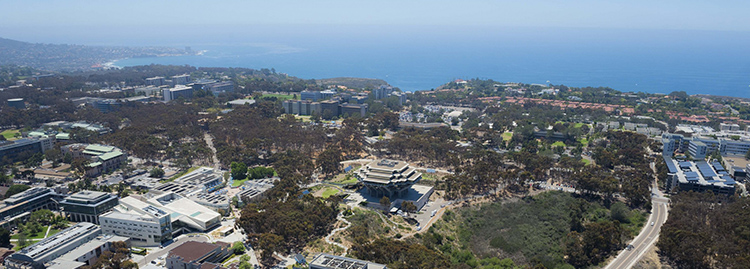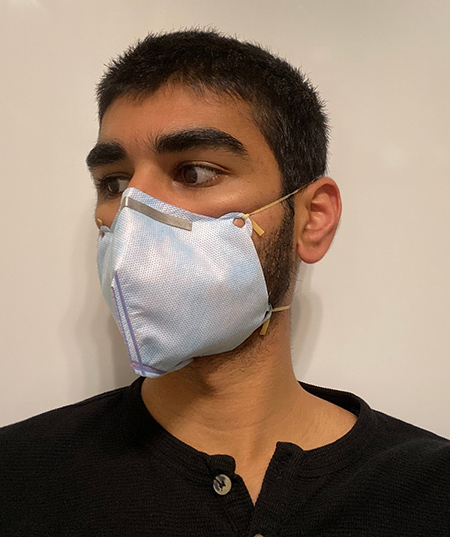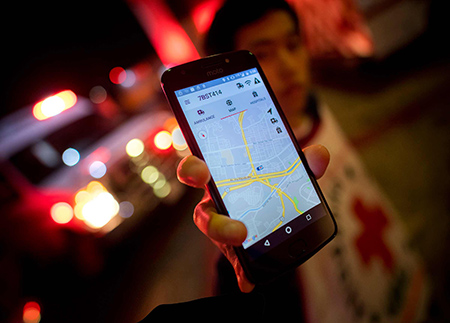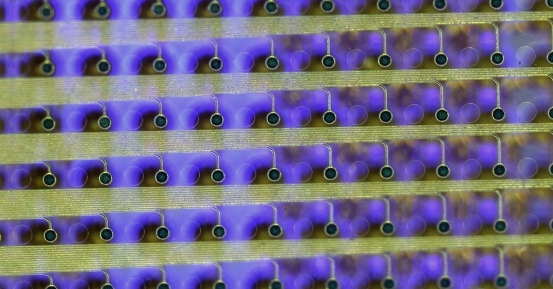
A Cross-Border Approach to Tackling COVID-19
UC San Diego researchers partner with experts in Mexico on medical, economic and social solutions during the pandemic
Published Date
By:
- Erika Johnson
Share This:
Article Content

UC San Diego and Mexico have forged strong partnerships that have proven to be lifesaving in this time of need for both countries. Photo by Erik Jepsen/Publications.
Located just 30 miles from the U.S.-Mexico border, the University of California San Diego is a critical partner in supporting a binational response to the COVID-19 pandemic. The crisis has spurred action among faculty, researchers and students at UC San Diego. Their partnership with Mexico ranges from developing best practices to treating severe cases requiring ventilators; devising new ways to manufacture personal protective equipment; opening dialogue about how the virus is impacting economies and underserved communities; and designing public health programming to slow the spread of the virus.
This disease does not recognize borders, making it more important than ever to strengthen relationships between experts at UC San Diego and in Mexico to coordinate a rapid response,” said UC San Diego Chancellor Pradeep K. Khosla. “Our university has mobilized to help slow the spread of the virus, fortify vulnerable populations and protect health care specialists in San Diego and Tijuana. We are one region facing the same battle, and together we will persevere.”
Uniting to solve the most severe cases of COVID-19
When the SARS-CoV-2 virus travels deep into the lungs of patients and triggers deadly inflammation, it is imperative to tap into the expertise of pulmonologists, respiratory therapists and other experts whose growing knowledge about the virus can help save lives. UC San Diego Health was the first hospital in San Diego to care for patients with COVID-19, positioning the university to be a leading institution in accelerating research and treatments.
UC San Diego’s Chief of Pulmonary, Critical Care and Sleep Medicine Jess Mandel, M.D. has cultivated a team of San Diego experts who can advise colleagues in Tijuana’s General Hospital on how to manage patients whose severe condition requires them to be on ventilators. The mission, called Aliados por Salud, unites a volunteer team of critical care doctors, nurses and respiratory therapists who collaborate daily with their counterparts in Tijuana on how to best treat patients with COVID-19.
This country is one of our best friends, and we certainly want to do what we can to assist our physician and nurse colleagues in dealing with this challenge," said Mandel in an article in the San Diego Union-Tribune. “We hope to be able to share our experiences, and we hope to learn from their experiences.”
A new study at the UC San Diego School of Medicine is investigating whether substance users within the San Diego and Tijuana border region may present a higher risk of acquiring and transmitting COVID-19. Led by Associate Dean of Global Health Sciences Steffanie Strathdee, the study is funded by the National Institute on Drug Abuse. The research explores factors such as living conditions like incarceration or homelessness; drug-seeking behaviors including time spent on the street; as well as specific types of substances that may damage cilia and lung tissue that could predispose people who inject drugs to becoming infected with SARS-CoV-2 and complications.
Slowing transmission through public health education
Located on both sides of the San Diego-Tijuana border is a network of field hubs called the UC San Diego Community Stations that blur the boundaries between research, teaching and service. Led by UC San Diego’s Center on Global Justice in partnership with numerous nonprofit organizations in both countries, these stations have been a key avenue for advancing COVID-19 mitigation projects.
At the UCSD-Alacrán Community Station in Tijuana, public health educational content has been developed by students and researchers at the center in collaboration with UC San Diego’s School of Medicine for the more than 300 Central American and Haitian migrants living in the emergency settlement. The information—covering topics such as how the virus is transmitted, the importance of hand washing and signs of infection—is delivered via 10 computer stations and a large display screen. The programming is designed and executed remotely by undergraduate and graduate students from public health, social sciences, visual arts, engineering and environmental systems. The initiative is growing to soon include a “promotora program,” which invites women in Latinx communities to help facilitate public health information and programming.
Virtual binational dialogues spark solutions
In March, the UC San Diego Center for U.S.-Mexican Studies launched a weekly webinar series, “COVID-19: U.S.-Mexico Interdependence and Cooperation,” to facilitate binational dialogue and informed debate between both countries. These webinars have featured renowned academics, scientists, doctors and public officials from both countries and attracted nearly 100,000 unique viewers. The discussions feature a range of topics, spanning the impact of the pandemic on minority communities to balancing economic and health care priorities as well as how the U.S. and Mexico can collaborate to speed the development of treatments.
The Center for U.S.-Mexican Studies, which is located at the university’s School of Global Policy and Strategy, has also initiated a collaborative research project that can inform new policies in the context of COVID-19. In partnership with UC Davis and UC Irvine, researchers are investigating the effects of socioeconomic inequality in the livelihoods of former California residents (now deported) and potential California residents (now delayed). The researchers are convinced that migration and deportation dynamics within the “CaliBaja” bi-national mega-region will continue to shape Mexico and U.S. international relations, particularly during the pandemic.
Laser-cut face shields, cloth masks, and other donations designed to offset equipment shortages
As the availability of personal protective equipment (PPE) supplies in Baja California dwindles as a result of the COVID-19 crisis, UC San Diego researchers, physicians and students are developing solutions and building a network of collaborators to help. Department of Computer Science and Engineering Associate Professor Nadir Weibel and a team of students have created multi-layered fabric face masks created with guidance from Qualcomm Institute (QI) Prototyping Lab engineers using one of the laser cutters available in their facility on campus. “We have been able to produce a surgical mask that has better protection than any other DIY masks out there,” said Weibel, whose team has produced and tested 4,500 face shields and 1,100 masks to supply hospitals in Tijuana, Mexico.
After engineering an initial batch of masks and face coverings, Weibel partnered with Linda Hill and Eliah Aronoff-Spencer, both with UC San Diego Health and QI, to develop a PPE pipeline to Mexico, working closely with the San Diego Mayor’s Office of International Affairs, the State of Baja Economic Development Authority and others. The group’s next goal is to partner with industry in Baja to scale up their efforts and fully implement their project.

Shiv Patel, a student at UC San Diego, models one of the DIY masks being developed by the Human-Centered and Ubiquitous Computing Lab and others.
They are supplying their instructions and specifications in both English and Spanish so local manufacturers can contribute to their creation. The protocols to make this equipment are also available to anyone, in both English and Spanish, through UC San Diego’s Earth2.0 COVID-19 Rapid Response platform, an online portal that supports information sharing, rapid science and innovative solutions during this public health crisis.
In addition, researchers and machinists at Scripps Institution of Oceanography at UC San Diego have been producing face shields out of polycarbonate in collaboration with the university’s Campus Research Machine Shop. Dale Stokes, a researcher at the Marine Physical Laboratory, and Joe Mayer, a machinist with the Center for Aerosol Impacts on Chemistry of the Environment (CAICE), began creating prototypes that can be mass-produced. After testing and approval by health workers, the team developed 2,000 face shields for a local hospital, and another 2,000 for health workers in Tijuana who do not have any protective equipment at all.
UC San Diego Health has also coordinated a donation to provide PPE to health care leaders in Tijuana through a partnership with the Consulado General of Mexico in San Diego and ISESALUD. The donation, via the health system’s Supply Chain Management team, is set to occur this summer and will include thousands of gloves, face shields, ear-loop masks and N95 respirators.
A mobile app to accelerate ambulance arrivals
When an emergency call is received in Tijuana, Mexico, dispatchers now have the capability to immediately assign the nearest available ambulance through a new mobile app developed by students in the Global Ties Program at the UC San Diego Jacobs School of Engineering. The technology allows dispatchers to see where units are located, which ones are available and where the nearest hospital is located—an improvement upon the previous radio dispatch system that did not offer real-time tracking. To further aid health care personnel, students added a notification system for doctors and medical coordinators at hospitals to receive an alert when an ambulance is transporting a patient who may have COVID-19.

Engineering students have developed a smartphone app that allows emergency response teams in Tijuana to dispatch available ambulances and locate the nearest hospitals in real time. Photo by Erik Jepsen/Publications.
First deployed in Feb. 2019 to over a dozen Cruz Roja (Red Cross) ambulances, the app is now being expanded to all of the ambulances coordinated by the Secretaria de Salud (Health Department) in Baja California to better address the rising number of calls during the pandemic. In addition to accelerating arrival times, the technology is more cost efficient as it can be operated through an Android cell phone onboard. Future plans include developing a second app that will track the availability of equipment at hospitals such as beds, x-ray machines and operating rooms to give emergency medical technicians more information on which hospital is best equipped to care for the patient.
UC San Diego and Mexico have forged strong partnerships that have proven to be lifesaving in this time of need for both countries. In the midst of the COVID-19 crisis, experts from both sides of the border are innovating to ensure patients get the care they need, communities are protected with knowledge about the virus and response teams are well equipped to tackle the disease.
Share This:
You May Also Like
Stay in the Know
Keep up with all the latest from UC San Diego. Subscribe to the newsletter today.


